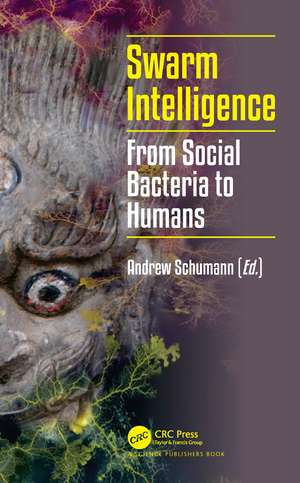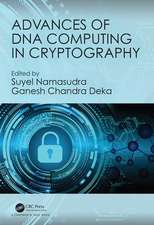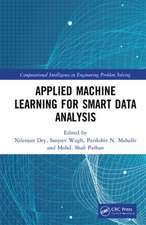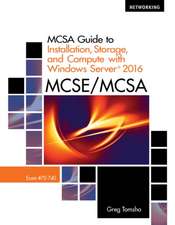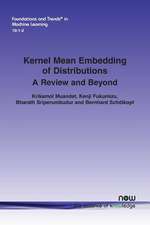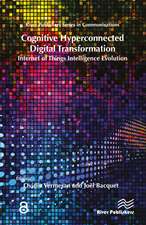Swarm Intelligence: From Social Bacteria to Humans
Editat de Andrew Schumannen Limba Engleză Hardback – 2 noi 2020
An intelligent behavior of swarm individuals is explained by the following biological reactions to attractants and repellents. Attractants are biologically active things, such as food pieces or sex pheromones, which attract individuals of swarm. Repellents are biologically active things, such as predators, which repel individuals of swarm. As a consequence, attractants and repellents stimulate the directed movement of swarms towards and away from the stimulus, respectively.
It is worth noting that a group of people, such as pedestrians, follow some swarm patterns of flocking or schooling. For instance, humans prefer to avoid a person considered by them as a possible predator and if a substantial part of the group in the situation of escape panic (not less than 5%) changes the direction, then the rest follows the new direction, too. Some swarm patterns are observed among human beings under the conditions of their addictive behavior such as the behavior of alcoholics or gamers.
The methodological framework of studying swarm intelligence is represented by unconventional computing, robotics, and cognitive science. In this book we aim to analyze new methodologies involved in studying swarm intelligence. We are going to bring together computer scientists and cognitive scientists dealing with swarm patterns from social bacteria to human beings. This book considers different models of simulating, controlling, and predicting the swarm behavior of different species from social bacteria to humans.
| Toate formatele și edițiile | Preț | Express |
|---|---|---|
| Paperback (1) | 486.68 lei 6-8 săpt. | |
| CRC Press – 15 mai 2022 | 486.68 lei 6-8 săpt. | |
| Hardback (1) | 976.19 lei 6-8 săpt. | |
| CRC Press – 2 noi 2020 | 976.19 lei 6-8 săpt. |
Preț: 976.19 lei
Preț vechi: 1464.44 lei
-33% Nou
Puncte Express: 1464
Preț estimativ în valută:
186.82€ • 202.86$ • 156.93£
186.82€ • 202.86$ • 156.93£
Carte tipărită la comandă
Livrare economică 22 aprilie-06 mai
Preluare comenzi: 021 569.72.76
Specificații
ISBN-13: 9780367137939
ISBN-10: 0367137933
Pagini: 190
Ilustrații: 3 Line drawings, color; 51 Line drawings, black and white; 8 Halftones, color; 5 Halftones, black and white; 7 Tables, black and white; 11 Illustrations, color; 56 Illustrations, black and white
Dimensiuni: 156 x 234 x 18 mm
Greutate: 0.51 kg
Ediția:1
Editura: CRC Press
Colecția CRC Press
Locul publicării:Boca Raton, United States
ISBN-10: 0367137933
Pagini: 190
Ilustrații: 3 Line drawings, color; 51 Line drawings, black and white; 8 Halftones, color; 5 Halftones, black and white; 7 Tables, black and white; 11 Illustrations, color; 56 Illustrations, black and white
Dimensiuni: 156 x 234 x 18 mm
Greutate: 0.51 kg
Ediția:1
Editura: CRC Press
Colecția CRC Press
Locul publicării:Boca Raton, United States
Cuprins
1 Introduction 2 Swarm Intelligence for Morphogenetic Engineering 3 Ant Cemeteries as a Cluster or as an Aggregate Pile 4 Robust Swarm of Soldier Crabs, Mictyris guinotae, Based on Mutual Anticipation 5 Swarm intelligence in Cybersecurity 6 Emergence of Complex Phenomena in a Simple Reversible Cellular Space 7 Rough Sets over Social Networks 8 Logical Functions as an Idealization of Swarm Basic Reactions 9 On the Motion of Agents with Directional Antennae 10 Induction and Physical Theory Formation as well as Universal Computation by Machine Learning
Notă biografică
Andrew Schumann obtained his MSc (1998) and PhD (2003) degrees in Philosophy from Belarusian State University, Minsk, Belarus. After graduating, he was an Associate Professor at the Belarusian State University, Belarus, and is currently the Head of the Department of Cognitive Science and Mathematical Modeling, University of Information Technology and Management, Rzeszow, Poland. He participated in the project Physarum Chip: Growing Computers from Slime Mould supported by the Seventh Framework Programme (FP7-ICT-2011-8). He has authored books such as Behaviourism in Studying Swarms (2019) and Talmudic Logic (2012) as well as numerous papers.
Descriere
The book analyzes new methodologies involved in studying swarm intelligence. It brings together computer scientists and cognitive scientists dealing with swarm patterns from social bacteria to human beings. Topics include swarm computing, soldier crabs computing, social insects computing, ad hoc and sensor wireless network, bio-molecular computing.
